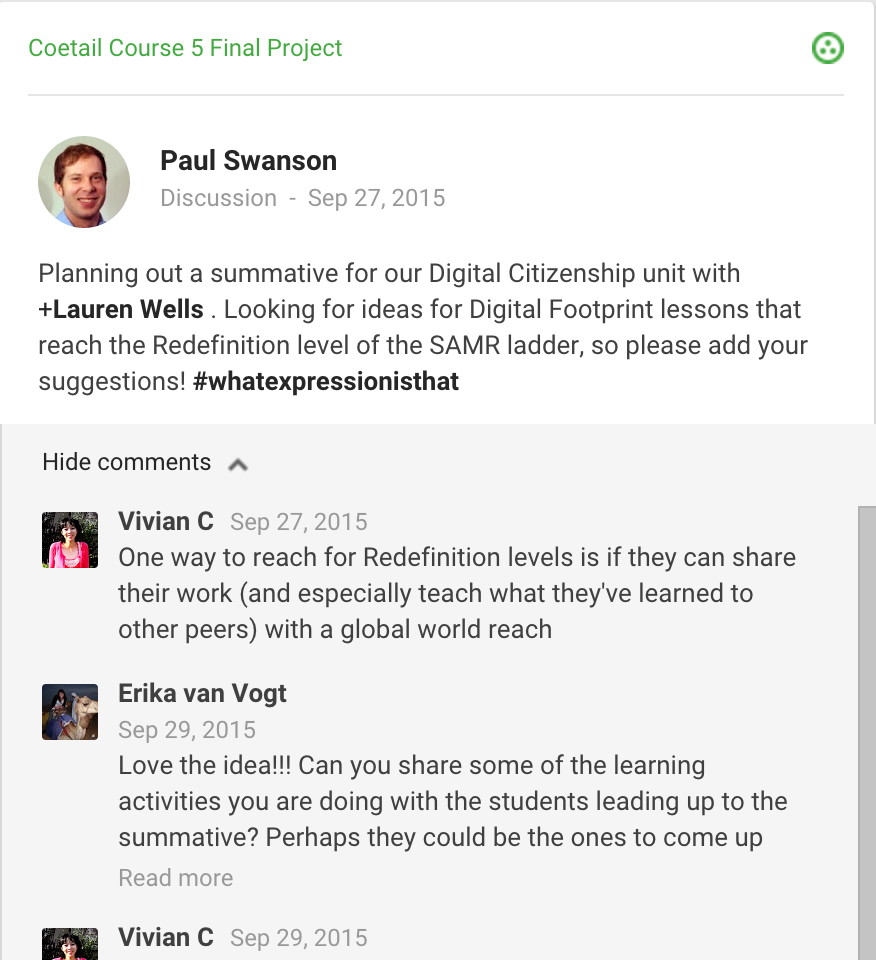This is my first blog post for Course 5 of COETAIL, but things have been cooking for the whole past month. As the MSHS Tech Coordinator at UNIS, one of my goals this year is “to develop and begin implementing a coherent tech literacy curriculum in grades 6-8”. After thinking about this broader goal last spring, I decided to focus my attention on an existing unit that is explicitly about tech literacy: Grade 8 Digital Citizenship.
Although there were lessons and units for this course from last year, there are two new grade 8 teachers this year and the team had decided to redesign the whole unit. One of the first questions that arose was: What is Digital Citizenship? All too often, it seems that we use the term for “whatever set of skills will solve all of our tech problems”. It would be as if teachers thought that a great civics unit would put an end to all bullying across the school. I don’t like the idea of including research skills like searching, or even image attribution, as Digital Citizenship because I think they have very weak equivalents when we talk about citizenship itself. Instead, I think of two major areas of Digital Citizenship: digital management and critical thinking.
- Digital Management
- Digital distraction / time management
- Online privacy and safety
- Digital footprint management
- Taking action against cyberbullying
- Critical Thinking and Reflecting
- Online-offline identities
- Understanding of how various media affect our minds
- Digital dilemmas and ethics
As I began working with the other G08 teachers they stumbled upon and adopted one of Kim Cofino’s grade 8 tasks – to create a lesson plan to teach an aspect of digital citizenship to the grade 6 students. Once we had an end-point from which to work backwards, I shared with the group the intro to Digital Citizenship and Digital Footprint workshop that I ran during the G08 orientation.
During the orientation workshop, we did a Google Form to get some information about how they are currently using various social media. Here are some of the results of that survey:

The next step is to devise solid reading, discussions, activities, and case studies that build the unit from start to end. Although I had devised two major parts to digital citizenship, the other teachers were looking at it from four categories:
1) Online safety and privacy
2) Online presence and persona
3) Community engagement
4) Ethics and responsibility
I just finished reading the book Disconnected by Carrie James of Harvard Project Zero, and her research has led her to a number of fascinating case studies that we hope to use to provoke interesting discussions with the students. If anyone has any additional ideas or activities along these lines, let me know!


One thought on “Project: Grade 8 Digital Citizenship”
I really like those four categories – I especially like number 2, I think that will be something very interesting for middle school students and they’ll have a lot to say. So glad the resources I shared were useful for you! Looking forward to seeing how this develops!